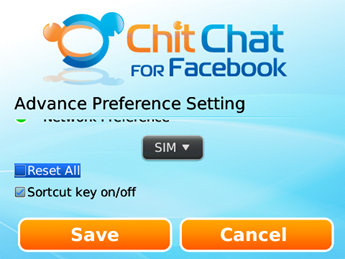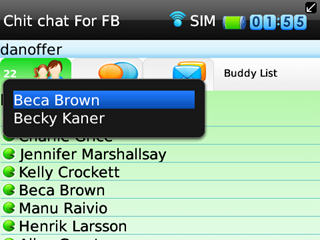Chit Chat for Facebook Blackberry and BeejiveIM for Android are remarkably similar instant messaging applications designed for use with Facebook. Despite their similarities, in a comparison between the two, Chit Chat comes out on top as a result of its thoughtful integration of shortcuts and the integration of irritating advertisements by BeejiveIM.
 Many mobile Facebook chat applications have rather difficult and sometimes frustrating installation procedures. This is not the case with either Chit Chat or BeejiveIM. In both cases, installation takes very little time. Once installed, BeejiveIM has a slight advantage in sign on times, taken approximately 5 seconds compared of Chit Chat’s 20 to go from entering a password to being logged in. This limitation is actually a result of a BlackBerry Facebook API and not the Chit Chat application itself. In the long run, the length of sign on time is of relatively little concern.
Many mobile Facebook chat applications have rather difficult and sometimes frustrating installation procedures. This is not the case with either Chit Chat or BeejiveIM. In both cases, installation takes very little time. Once installed, BeejiveIM has a slight advantage in sign on times, taken approximately 5 seconds compared of Chit Chat’s 20 to go from entering a password to being logged in. This limitation is actually a result of a BlackBerry Facebook API and not the Chit Chat application itself. In the long run, the length of sign on time is of relatively little concern.
Chit Chat uses a Facebook username and the standard Facebook password for its login. BeejiveIM, on the other hand, allows users to input either their standard Facebook email address and password or a mobile telephone number associated with their Facebook account and Facebook password. In either case, signing on is simple and straightforward.
Once logged in, users will find that the interfaces for both applications are remarkably similar as both are implement a system of three tabs. In both applications, the first tab represents the user’s buddy list. The buddy list in both applications displays both online and offline friends. BeejiveIM displays friends’ names along with their Facebook profile image. Chit Chat displays friends’ names along with simple icons that indicate if the friend is online, offline, or has just sent a message to the user. The Facebook Blackberry Chat app “Chit Chat” system is slightly more functional. It is also more visually pleasing due to the reduced clutter on the screen.
 After the buddy list, both apps provide a tab for current conversations. In BeejiveIM, this tab displays the current ongoing conversations, marking each conversation with a red number indicating how many messages the user has sent that have not yet been responded to. In Chit Chat, the functionality is nearly the same, though the tab itself will display the number of conversations that are contained within it so that users can see at a glance how many active conversations they have going on. The Chit Chat approach is actually more useful for the conversations tab when considered in tandem with the function of the third tab.
After the buddy list, both apps provide a tab for current conversations. In BeejiveIM, this tab displays the current ongoing conversations, marking each conversation with a red number indicating how many messages the user has sent that have not yet been responded to. In Chit Chat, the functionality is nearly the same, though the tab itself will display the number of conversations that are contained within it so that users can see at a glance how many active conversations they have going on. The Chit Chat approach is actually more useful for the conversations tab when considered in tandem with the function of the third tab.
In Chit Chat, the third tab is reserved for messages that have been sent but for which the user has yet to respond. This tab displays an icon letting the user know how many messages are waiting. It is an excellent way of keeping track of chats and ensuring that friends get a response in a timely manner. In BeejiveIM, the third tab provides access to the user’s Facebook profile as well as the Facebook app if it is installed on the phone. If the Facebook app is not installed, BeejiveIM will offer to install it. In general, the third table in BeejiveIM is less useful than in Chit Chat. After all, it seems rather redundant to have dedicated a tab to the Facebook apps when it could easily be navigated to from the phone application directory.
In terms of customization, once again Chit Chat and BeejiveIM are remarkably similar. Both applications allow users to set wallpaper color and texture, change the default way in which messages are displayed, show emoticons, and determine how the phone notifies users of the receipt of the new message. There are, nonetheless, subtle differences.
The first difference is that Chit Chat allows users to set the color of the ingoing and outgoing text as well as the font size. No such option is available in BeejiveIM. Setting color is fun and setting font size can be very helpful to those who make extensive use of the app in order to avoid eye strain, fatigue, and headache.
The second difference is that BeejiveIM allows users to take photos and use those as a background to chats. While this may initially seem like a useful and entertaining feature, most users will revert to a solid color due to the fact that reading messages against a photo background can be quite difficult, if not impossible.
A third major difference between these two Facebook chatting applications is Chit Chat’s incorporation of shortcut functions. Because navigating any application on a mobile device can be somewhat tedious, Chit Chat has included a number of shortcuts intended to speed up common functions and help save the user from the need to make repetitive movements. The shortcuts are highly intuitive and include the ability to quickly scroll through user lists by simply pressing Alt + Scroll, along with many other exceptionally useful shortcuts. Once spoiled by the shortcut functions of Chit Chat, users will come to expect them and other applications and wonder how they ever lived without them.
As a final point, is worth mentioning that while Chit Chat for Facebook Blackberry costs $1.99, BeejiveIM is free. On the face of it, it may look as though a free application is the smart choice. However because BeejiveIM is free to users, it supports itself through advertisement. These advertisements can become distracting and ultimately irritating when they are accidentally clicked on, which results in the user be directed away from BeejiveIM to a full screen advertisement. In the end, the $1.99 price tag on Chit Chat is worth the investment in order to have an ad-free application. BeejiveIM is available in the Android Market. Chit Chat can be downloaded from MobiHand.
